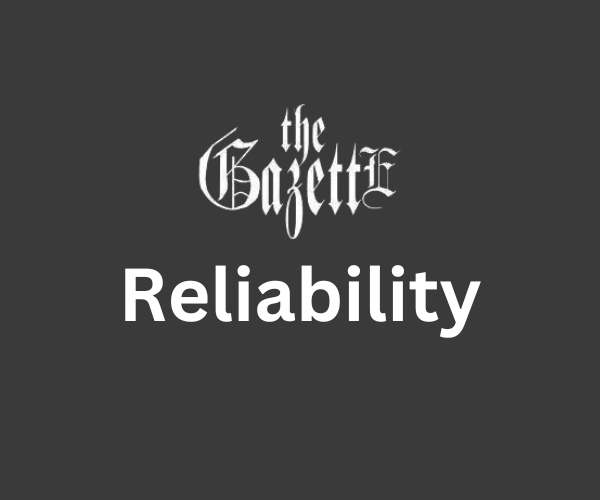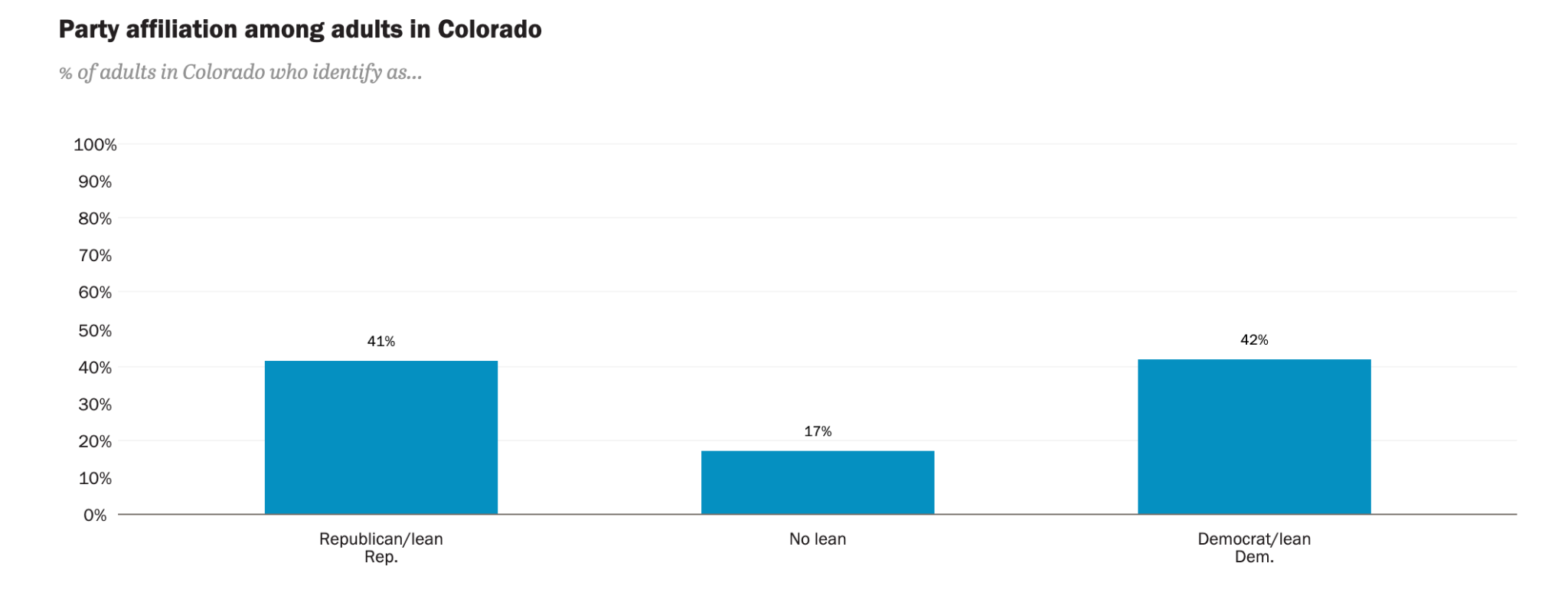
As a paper with an audience of over 100,000 readers, it is important that news outlets like the Colorado Springs Gazette are providing truth in its articles. The Gazette, with its reputation as a Pulitzer prize winning newspaper, is presumed to have this reliability. It has been commended on the basis that it has provided unbiased and factual journalism. However, it is common for newspapers to cater towards their readers’ political preferences, sometimes sacrificing the accuracy of their reporting in favor of pushing agendas. In Colorado, Pew Research found that the party affiliation of adults in Colorado is almost evenly split between Democrats and Republicans.

Source: Pew Research
However, with the right-leaning demographic of Colorado Springs that the paper serves, could the paper be less reliable than initially thought? At Biasly, we endeavor to evaluate the accuracy and dependability of all media outlets. To verify the reliability and accuracy of the Gazette, we will look further into its articles and editorial decisions.
Does Reliability Matter?
Reliability, in general, refers to how trustworthy or accurate information, or in this case, a news source is. If we consider this definition, it quickly becomes clear why reliability is important in media sources. If we can’t trust the things we read then there isn’t much of a point in continuing to consume content from that source, after all. So how exactly can we gauge the reliability of a news source anyways?
There are several potential measures of reliability to look out for when trying to determine whether a media source is reliable or not. Red flags for an unreliable article can include the presence of wild unsubstantiated claims, facts dependent on other unreliable sources, heavy use of opinionated language, and more. Some indicators of a reliable news source, on the other hand, include things like:
- Absence of subjective/opinionated language in articles
- Credible sources cited (e.g., neutral sources, .gov, .edu websites)
- Facts and statistics backed by multiple relevant outside sources
- Use of primary sources when possible (e.g., interviews, quotes)
- Information that remains consistent across news sources
So How Does the Gazette Fare in its Reliability?
The political reliability index developed by Biasly objectively assesses news organizations’ accuracy and trustworthiness. The Gazette’s overall Reliability Score has been rated as ‘Good’ by Biasly. This rating is a weighted average of two distinct scores: the Fact Analysis Score and the Source Analysis Score, each evaluating separate components of the Gazette’s Reliability. When computing the Average Reliability of the article the Fact Analysis score is more heavily weighted. These ratings are as follows in the next two paragraphs:
The Gazette’s Fact Analysis Score is ‘Excellent,’ which suggests that readers can reliably trust the majority of the Gazette’s online content. The Fact Analysis score focuses more on the accuracy of claims, facts, and sources presented in the article and any hints of selection and omission bias, which we will discuss further in the article.
The Gazette’s Source Analysis Score is ‘Fair,’ which suggests readers can trust some of the sources, links, and quotes provided by the news source. This score, which is based on A.I., focuses on assessing the quality of sources and quotes used including their number, lengths, uniqueness, and diversity.
However, since these scores are based on percentages and averages, individual articles could vary in their level of trustworthiness depending on the context, author, and other factors. To gauge a better understanding of the reliability of the Gazette, we will analyze the supporting data for the Gazette’s reliability ratings and discuss what to watch out for while searching for trustworthy news sources.
The Gazette’s Accuracy and Reliability
Bias and political orientation play large roles in the credibility of news organizations. The Gazette’s editor has been accused of writing a “biased” and “poorly researched” column by a local TV station in Colorado Springs. We can evaluate the integrity of the Gazette’s news stories and see whether this is indeed the case that the articles’ reports lack evidence and contain bias. We will also search for selection and omission bias as we assess the articles’ correctness and factuality.
Selection bias is when stories and facts are selected or deselected, often on ideological grounds, to create a narrative in support of the new sources’ ideology. Omission bias, on the other hand, is when different opinions and political views regarding a situation are left out so that the reader is only exposed to the ideological perspective supported by the author. It’s important to keep in mind these two types of biases when trying to assess an article’s level of accuracy.
Biasly assigns a percentage score to accuracy, with one being the least accurate and 100 being the most. To calculate ratings, Biasly factors in the number of reliable internal sources, assertions with backing evidence, and the number of reliable external sources used. As previously mentioned, according to the reports analytics have assessed, the Gazette has a Good reliability score.
This score can vary from article to article, though, and the most extreme variations in dependability are caused by bias, notably omission, and selection bias. Consider CNBC, which has a “Somewhat Liberal” Bias and a “Good” analyst reliability score according to Biasly. For example, they had one article that had an “Excellent” reliability score titled, “200 million vaccine shots, hot markets, big spending – Biden’s first 100 days, in charts,” and another article called, “Supreme Court says that California can’t require all nonprofits to disclose their donors,” that had a “Fair” reliability score. As a result, stories displaying political leaning are less reliable than neutral ones.
For instance, this Gazette article titled, “Colorado Democratic Party, convention delegates ‘overwhelmingly’ endorse Kamala Harris for president” is rated as Very Liberal. Concerning the selection and omission bias, the author Ernest Luning tries to include perspectives from both Republicans and Democrats, but Democrat’s perspectives are included more often given the subject nature of the article. However, many of these quotes paint Harris in a very positive light, choosing to emphasize the support she has garnered in the Democratic party. For instance, Indira Duggirala, Colorado Democrats’ first vice chair and member of the Asian American and Pacific Islander community, expressed her enthusiasm about Harris being the first Indian American on a national ticket:
“Her unwavering commitment to justice, equality and inclusive leadership resonates deeply with me and our community,” Duggirala said. “Vice President Harris’s vision for America aligns with our values, and I am confident she will lead us towards a brighter, more unified future.”
This article portrays a very liberal stance, mostly due to the overwhelming amount of quotations used in the article that speak very positively and optimistically about Harris. Though this is in line with the aim of the article – to show the support Harris has within her party – it is biased given the sheer amount of positive statements about her that are free from any criticism. Additionally, the article does not include statements from Democrats who have not endorsed her nor spoken against her becoming the nominee. Considering both these aspects of the article, Luning does not succeed in balancing his sources in this article while reporting on the support for Harris for president. If Luning had included more Democratic sources who did not support Harris, or even some commentary with possible criticism of her candidacy that had not been mentioned by sources, the article would have been less biased, and therefore, more reliable.
We will look deeper into more examples like this below, providing a further investigation into the reliability of the Gazette’s articles. This will include its use of selection bias, omission bias, and the quality of its sources and facts used.
Analysis of Reliability in the Gazette’s Online News Articles
The Gazette’s online news articles aim at providing its readers with factual and objective reporting. While the paper may sometimes lean more conservative, it is important to distinguish their regular online news content from their opinion pieces. When these lines are blurred, the credibility of information can come into question.
Quality of Sources and Facts Used
The Gazette mostly publishes articles that use reliable sources from both sides of the ideological divide and cite facts as evidence. However, this may not mean every article that achieves this is entirely reliable. For instance, consider the article, “Trump campaign ties Kamala Harris to Biden as Democratic ticket pivots: ‘Joe Biden 2.0’.” In this somewhat short article from Jack Birle, there were 11 quotes. Of the 11, five were short, three were medium-length, and three were long quotes. Quotes that are longer in length are potential indicators of higher reliability if the source is reputable.
In addition to that, the author’s 7 sources for the article were as follows:
- The Trump Campaign (Conservative)
- Kamala Harris (Liberal)
- RealClearPolitics Polling (Center)
The number of sources used seems to be a little low, and though the article is centered around Donald Trump’s Campaign and Harris, more sources would make it more credible and reliable. Additionally, even though the sources are also both liberal and conservative, it does not quite provide an even balance of perspectives. The quotes from Harris are only used to support the points that Trump’s campaign is making. The article is accurate in the sense that it reflects the campaign strategy, but it is not free from bias due to the lack of a substantial liberal viewpoint to counter that of the conservative.
The article is reliable in the sense that it does in fact reliable sources from both sides of the ideological divide and cite facts as evidence. Biasly even rated this article as “Good” for reliability. However, If the article had used more sources, and especially quotes from a liberal source that countered the remarks of the Trump campaign, this article would be less biased and consequently, more reliable.
Selection and Omission Bias
In another example from the Gazette, we can see a more fair and reliable account of political events without the omission bias we looked at previously. The article, “Biden campaign outraises and outspends Trump campaign in June” by Jason Lange, focuses on both of the campaign donations that Joe Biden and Trump received. It takes turns pointing out the highlights and flaws of each of the candidates’ campaigns. For example, Lange writes:
“The largest super PAC supporting Trump, known as MAGA Inc, reported raising over $22 million during the month, including $5 million contributions by hotelier Robert Bigelow and by Linda McMahon, a former professional wrestling entrepreneur.”
“On Biden’s side, LinkedIn co-founder Reid Hoffman gave $3 million to FF Pac, a super PAC backing the president’s re-election effort, a separate filing with the Federal Election Commission showed.”
These quotes exemplify the use of facts throughout the article. Though the title of the article discusses the success of Biden’s campaign, the author is able to portray the campaigns without any significant bias, mentioning the success of Trump’s campaign over Biden’s in the previous month. Additionally, the article uses mostly centrist sources. Overall this article does a good job avoiding selection and omission bias, making it reliable for readers.
So Is the Gazette Reliable?
Finally, it can be argued that the Gazette is a mostly reliable news source with a good reputation for journalistic integrity. However, there are some exceptions that skew the facts, therefore preventing the paper from receiving an excellent reliability rating. The more you research media reliability and accuracy, the simpler it will be for you to identify problems with sources, selection, omission, and factuality. To help with this, you can use Biasly’s News Bias Checker to uncover reliability problems and assist you in finding the most accurate and dependable news.




























